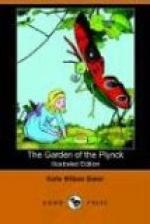“In the meantime, Sara, you’d better dress me more suitably,” suggested the Billiken kindly. Sara had never heard him object before to wearing the Baby’s long dress; but he was evidently looking forward to a race and did not wish to be handicapped.
So Sara sat down on the blue plush grass, and undressed the Billiken while they waited for Schlorge. She had time now to notice that the snow had melted and left everything beautifully fresh and bright, just as Pirlaps had assured her it would do. She had never seen the Garden look so lovely and spring-like. She was glad, too, to see that the stump had grown back exactly as it was; they had even removed the ropes and scaffolding.
She took the Baby’s clothes off the Billiken, and left him all free and unimpeded in his own, fat, white, furry body. You see, she always called the Teddy-Bear the Brown Teddy-Bear because the Billiken was his first cousin, and had a white Teddy-Bear body; it was only their colors and their heads that were different. Oh, yes,—and their dispositions; for the Billiken was a supremely cheerful person, while the Brown Teddy-Bear was a misanthrope. Sara had always known that he had something very depressing on his mind; and she was planning, now that he had learned to talk, to ask him what it was at the first suitable opportunity.
When she had got the clothes off the Billiken, she started to put them on the Baby; but the Baby behaved as it had never done before. It had always been a good baby, adapting itself amiably to any schedule its mother saw fit to adopt. Sara saw at once that animated babies are not so easy to manage as inanimate ones; for the Baby kicked and cried and positively refused to be dressed. So Sara, who was really a very young mother, and had not yet trained herself to be firm and self-willed and contrary, put the Baby’s clothes in her pocket with the yarn and knitting needles and a ginger-snap she had brought, and set the stubborn Baby down on the blue plush grass, where it rolled around quite happily again in its red sash and parasol.
And just at that moment she saw good old Schlorge hurrying down the path from the Dimplesmithy with the Gunkus at his heels.
Of course they all had to tell Schlorge about it at once, even the dolls (all except the Brown Teddy-Bear), so that Schlorge looked quite wild, and scratched his head a good deal before he was finally quite clear what had happened. Then he turned and looked thoughtfully down the path they had pointed out to him, and scratched it some more. Finally he said slowly,
“I tell you what we’ll have to do,”—and then, looking about him all at once very wildly,—“where’s the stump—I’ll have to tell Sara! Where’s the—”
But this time he found it without loss of time; and scrambling upon it, he adjusted his hands and shouted loudly,




